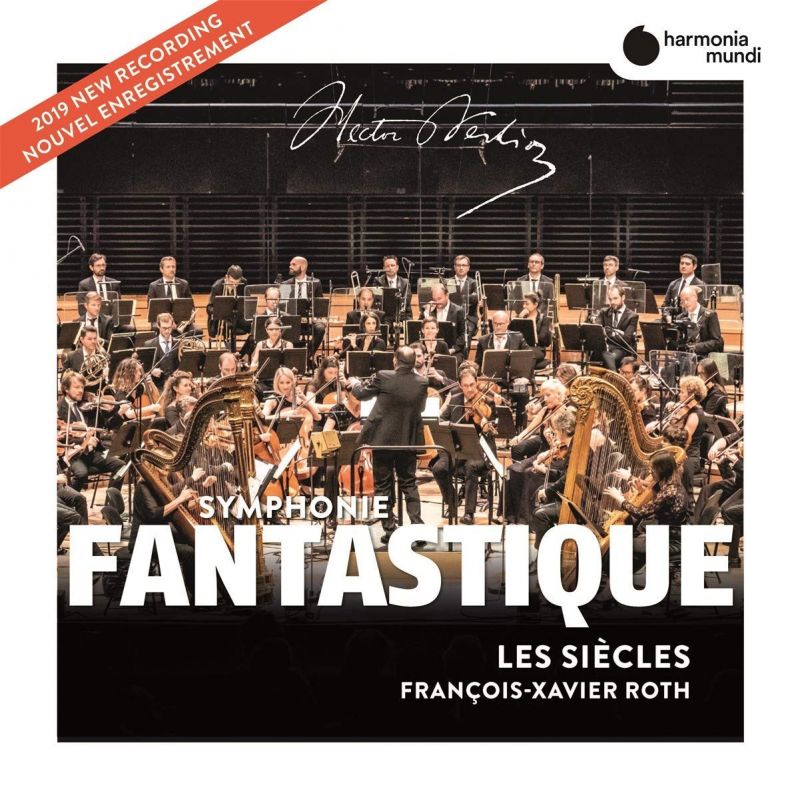BERLIOZ Symphonie Fantastique (Roth)
View record and artist detailsRecord and Artist Details
Composer or Director: Hector Berlioz
Genre:
Orchestral
Label: Harmonia Mundi
Magazine Review Date: 12/2019
Media Format: CD or Download
Media Runtime: 66
Mastering:
DDD
Catalogue Number: HMM902644

Tracks:
| Composition | Artist Credit |
|---|---|
| Symphonie fantastique |
Hector Berlioz, Composer
François-Xavier Roth, Conductor Hector Berlioz, Composer Les Siècles |
| (Les) Francs-juges |
Hector Berlioz, Composer
François-Xavier Roth, Conductor Hector Berlioz, Composer Les Siècles |
Author: Mark Pullinger
Well, everything. As Leonard Bernstein once warned us, in Berlioz’s opium-fuelled Fantastique, ‘You take a trip, you wind up screaming at your own funeral’. François-Xavier Roth and his period-instrument orchestra have taken the trip from rêveries and passions to witches’ sabbath before, a live recording on their own label, performed at the festival in the composer’s hometown of La Côte-Saint-André in 2009.
But there is a touch of La Côte-Saint-André on this new Harmonia Mundi disc, which is rounded out with a rousing Francs-juges Overture. Among the meticulous orchestral listing in the booklet – everything from Frédéric Triébert oboe to Guatrot ophicleide – there’s one strictly non-period entry: church bells cast for the 2013 Berlioz festival … authenticity of another kind.
Much as I enjoyed Les Siècles’s earlier recording, this new disc sweeps that, and the rest of the competition, firmly aside. Its sound – recorded in the Maison de l’Orchestre National d’Île-de-France in Alfortville, just outside Paris – is clean and much more closely recorded, revealing much instrumental detail.
The success of this account is not just through the conductor’s close study of the autograph manuscript. Roth seems to have an emotional hotline to Berlioz, alive to every twist and turn of the composer’s fevered passions. Double basses judder so hard in the first movement (8'54") you can feel the rosin flying. ‘Un bal’ has a wonderful tingle factor, cooing clarinet recalling the idée fixe motif (4'56") associated with the object of our hero’s passion. The only movement where Roth is less expansive, a decade on, is the ‘Scène aux champs’. The engineers have perfectly judged the distant oboe (the older recording suffered a lot with extramusical hum at this point) and the woodwinds display bags of character. The string tremolando (6'53") bristles while the clarinet echo at 9'12" is exquisite, followed by a quasi niente which acts as a ghostly reminiscence. There are great thundering timpani as the poor cor anglais’s cries go unanswered, the oboe having long since abandoned her lover.
Bassoons sit in gruff judgement over Roth’s ‘March to the Scaffold’, a purposeful tread with heavy accenting from cellos and basses. If the orchestral guillotine that slices off the clarinet solo at the end is a bit messy, then I suppose that’s the nature of public executions. The ‘Songe d’une nuit du sabbat’ is pungently psychedelic, flutes and oboes playing their eerie octave glissandos with devilish glee, woodwinds cackling and the bassoon and ophicleide ‘Dies irae’ chants chilling the marrow. The tremolando violins and viola at 6'16" are far fiercer than on other recordings, one of a number of occasions I darted to check the score, but Roth is always right.
There have been several period-instrument recordings over the decades, many of them wonderful, although some suffer fatal flaws. The quest for historical authenticity took John Eliot Gardiner and the Orchestre Révolutionnaire et Romantique (Philips) to the old hall of the Paris Conservatoire, where the work premiered in 1830, a horrible, dead acoustic. Jos van Immerseel chose to have the bells played as piano chords on his Anima Eterna disc, on the flimsy basis that Berlioz once conducted a performance this way in St Petersburg. Marc Minkowski’s Les Musiciens du Louvre now sound pallid (DG). Interestingly, only Gardiner and Immerseel include the obbligato cornet à pistons in the Ball.
Roger Norrington and the London Classical Players have long been my HIP benchmark, a peppery reading, but Roth and Les Siècles surpass them for colour and characterisation. Indeed, this is not just my favourite ‘historically authentic’ recording. I strongly believe this is the finest account of the Fantastique to emerge from France since Charles Munch and the newly formed Orchestre de Paris in 1967 … and it probably trumps that too.
Discover the world's largest classical music catalogue with Presto Music.

Gramophone Digital Club
- Digital Edition
- Digital Archive
- Reviews Database
- Full website access
From £8.75 / month
Subscribe
Gramophone Full Club
- Print Edition
- Digital Edition
- Digital Archive
- Reviews Database
- Full website access
From £11.00 / month
Subscribe
If you are a library, university or other organisation that would be interested in an institutional subscription to Gramophone please click here for further information.




